19+ Sample Clinical Research Proposal
-
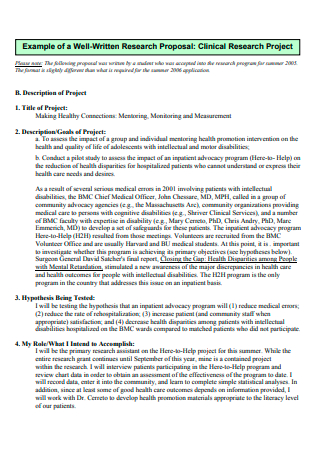
Clinical Research Project Proposal
download now -
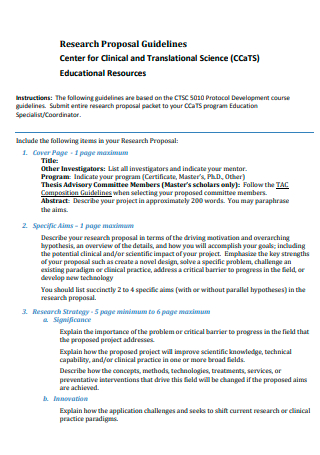
Center For Clinical and Translational Science Research Proposal
download now -
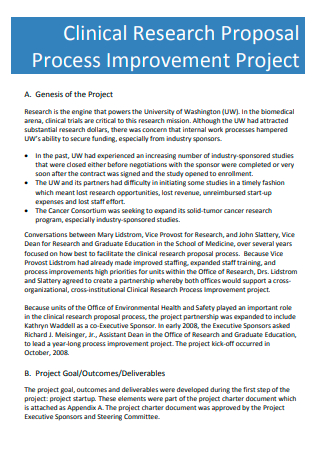
Clinical Research Proposal Process Improvement Project
download now -
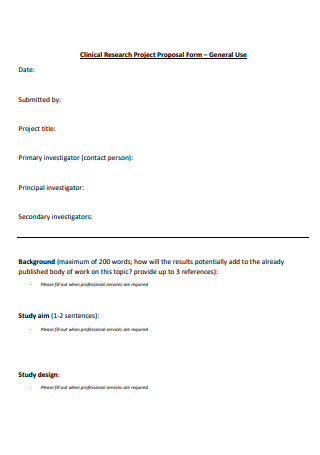
Clinical Research Project Proposal Form
download now -
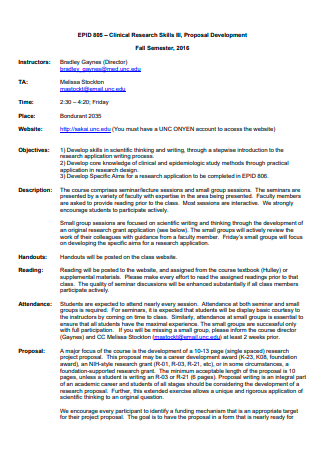
Clinical Research Skills Proposal
download now -
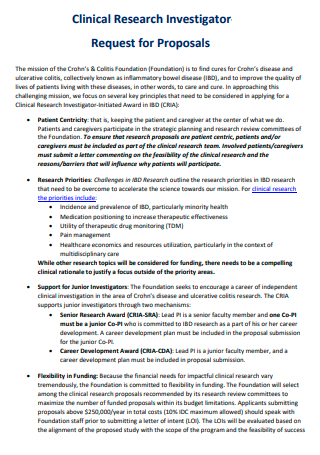
Clinical Research Investigator Proposal
download now -
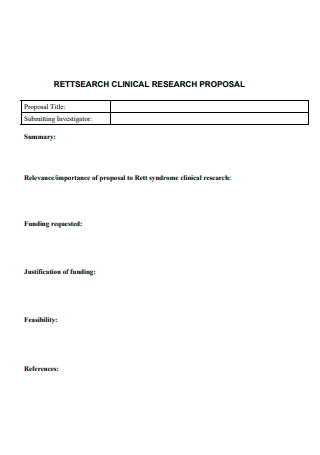
Clinical Research Proposal Example
download now -
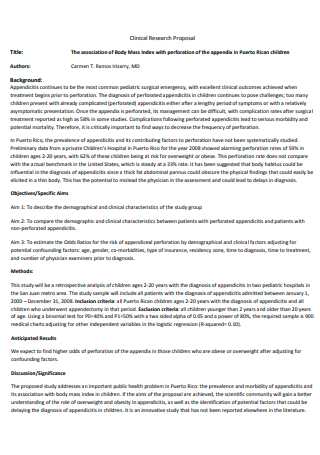
Clinical Research Proposal in PDF
download now -
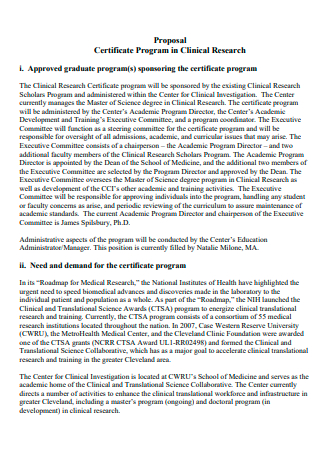
Clinical Research Certificate Program Proposal
download now -
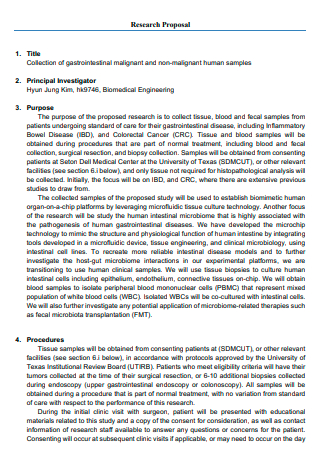
Basic Clinical Research Proposal
download now -
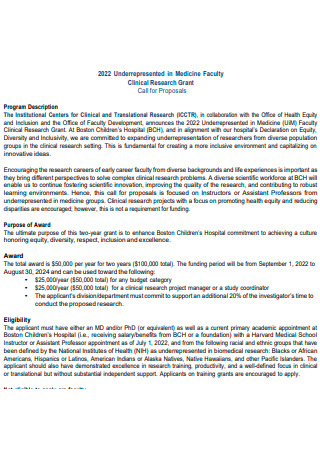
Clinical Research Grant Proposal
download now -
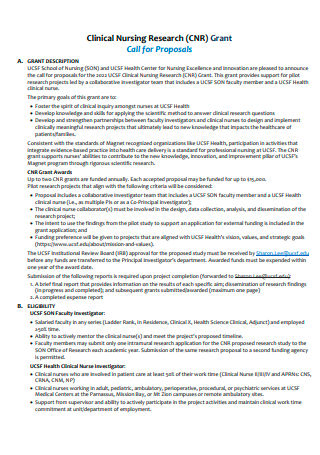
Clinical Nursing Research Grant Proposal
download now -
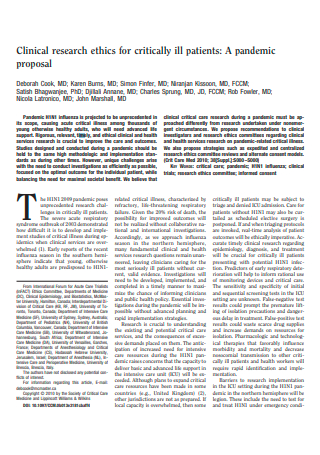
Clinical Research Ethica Proposal
download now -
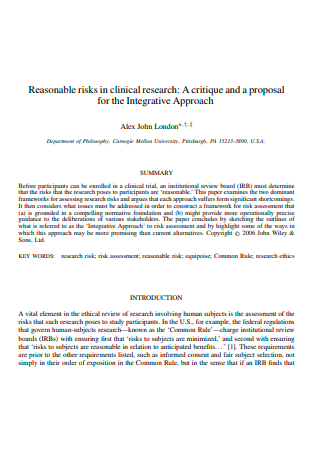
Printable Clinical Research Proposal
download now -
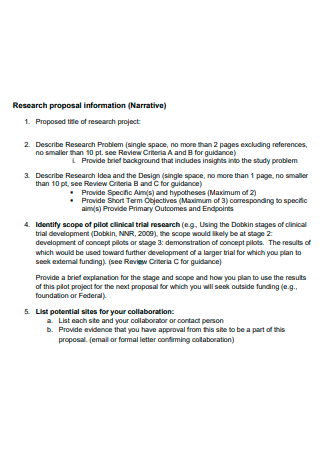
Simple Clinical Research Proposal
download now -
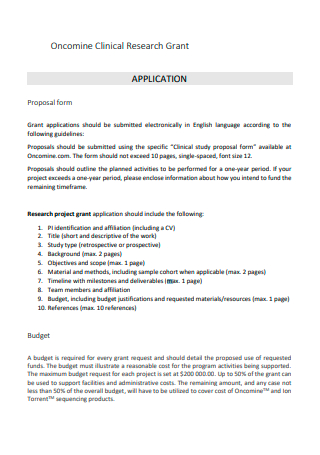
Clinical Research Grant Proposal Form
download now -
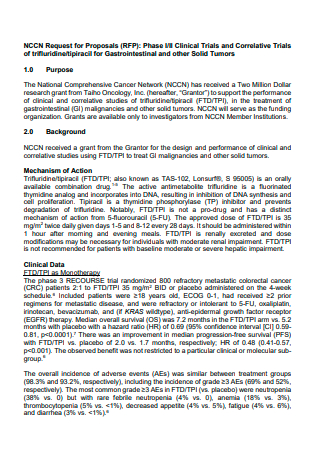
Clinical Trials Research Proposal
download now -
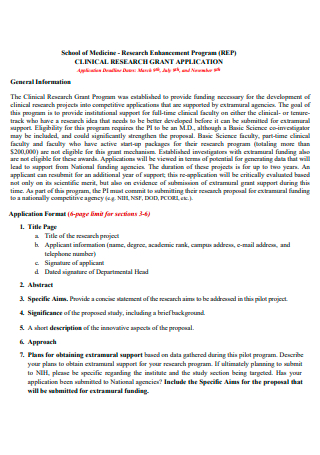
Clinical Research Grant Application Proposal
download now -
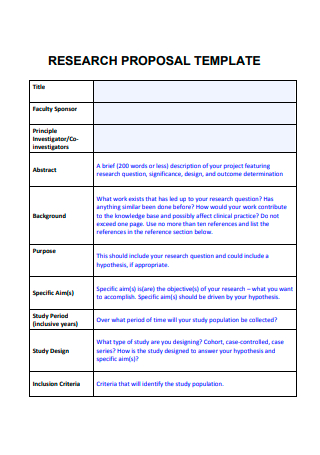
Clinical Research Proposal Template
download now -
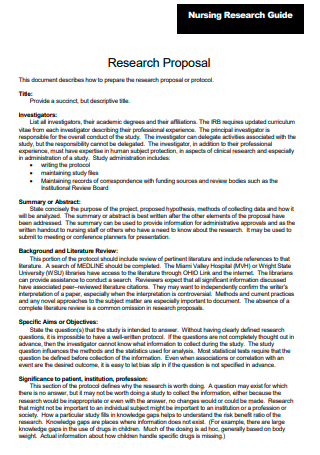
Clinical Nursing Research Proposal
download now
FREE Clinical Research Proposal s to Download
19+ Sample Clinical Research Proposal
What Is a Clinical Research Proposal?
When Writing a Clinical Research Proposal, What Should You Keep in Mind?
Elements of Clinical Research Proposal
Steps in Writing a Clinical Research Proposal
FAQs
How long should a research proposal be?
Why write a research proposal?
Why must you submit a research proposal?
What Is a Clinical Research Proposal?
If you’re writing a research proposal, you want to convince your potential funders that you’ve chosen a worthwhile topic for investigation and possess the required resources (such as expertise and time) to carry it out. In your research proposal, you should address the following questions: What you want to do, why you want to accomplish it, and how you intend to accomplish it. Panelists or possible partners will learn about and be convinced of the value of your chosen issue, and your research, data analysis, and copywriting skills will be tested as well. It’s important to note that clinical trials can take a long time to finish and as a professional, you must be willing to put in the time and effort necessary to complete them.
Other templates are available on our website, and you can use them whenever you need them. They are as follows: nursing research proposal, employment contract, work contract, labor contract, scientific research proposal, staffing agreement, employer agreement, work agreement, medical research proposal, financial consulting proposal, disclosure agreement, and other similar templates are available. This post will not only provide you with templates but will also provide you with important information that you need to know in order to complete your template.
When Writing a Clinical Research Proposal, What Should You Keep in Mind?
There are a few things to keep in mind before creating a clinical research proposal. All of these aspects must be worked out in advance because if you begin with data that is unclear, not only will the research panel be perplexed, but you as the researcher will be as well. In order to better understand your topic, you should have this material at hand.
1. Your Target Audience
There will be a variety of objectives and preferences for each possible donor or panelist to consider. It is possible that you will need to write several different versions of the proposal, depending on your target audience. In order for them to be interested in your idea, it is critical that you establish a professional yet personal connection with them early on. However, if they do not see how your study can help them achieve their organization’s vision, they may not reach out to you to see if they can provide funding for your research.
2. Pitfalls That Could Occur
Avoid submitting a proposal that is poorly defined since if panelists or your audience are unable to comprehend your major ideas, they will most likely become confused. If a proposal does not have a clear relationship to your audience’s or organization’s goals, they will not quickly recognize the benefits and will not consider it appropriate to support. Most importantly though, the way you, as the researcher, present the subject and demonstrate your willingness to see your proposal for a clinical study to completion is critical. You should also see our Data Sharing Agreement.
3. Data and Research
If you want to back up your claim and explain the goal of your proposal, you’ll need facts, statistics, graphs, and charts that are connected to the medical issue you have chosen as supporting evidence. Don’t include information solely for the sake of it; otherwise, your readers will become confused. Make sure you look into previous studies, both successful and unsuccessful, to get as much actual data, facts, and examples as you can to put together a persuasive proposal that will be taken seriously. You should also see our Sharing Agreement.
Elements of Clinical Research Proposal
Regardless of whether you search the entire internet for an answer, the answer to the question remains consistent. It was the University of Birmingham that was able to explain effectively what weakens a medical research proposal, and it is this information that we will share with you. Following this medical research proposal outline will assist you in understanding what is typically included and what is not included in medical research proposals.
Steps in Writing a Clinical Research Proposal
Most people are intimidated by the prospect of writing a clinical research proposal since they don’t know where to begin or what to do. As a result, this article provides you with a clinical research proposal structure that you can use as a guide. Additionally, we have organized the processes so that you are more aware of which information is relevant to which section. Maintain focus on the fact that the goal of preparing a proposal is to garner executive support and compel potential funders to consider your plan. Influential folks should support your project if you want it to be successful. To the greatest extent feasible, they should be moved by the plan, which would then lead to the next phase, which would be approval of the proposed medical research. Take a look at our sample clinical research proposal, which has been included in this post.
-
1. Define the Statement of the Problem
To convince your audience that your topic is a medical concern that should be treated as soon as possible, you must explain why you believe this is the case. This is the section of the medical research proposal where you must be able to grab the reader’s attention; otherwise, they will not be as interested in reading the rest of the proposal. Make certain that the ideas you are making are understood and agreed upon by your audience and panelists. But remember to keep things factual and avoid expressing personal or subjective thoughts.
-
2. Present Your Proposal
Naturally, what follows an issue is its resolution. This section discusses how your proposal fits into the picture in terms of providing a solution to the problem. You can reference similar studies that were close to being effective to demonstrate that your suggestion may be the exact solution that the medical sector requires to thrive. This section may be critical since you may be confronted with questions and arguments designed to assess your knowledge in defending your study topic. You can concentrate on a long-term answer even if it requires much more time to research.
-
3. Extend Your Research
This is the most critical section of the proposal since it details how the plan’s objectives will be met. It begins by outlining the technique and demonstrating why it is useful and effective. Additionally, it specifies how difficulties will be resolved. This phase allows you to elaborate on things that you may have missed in previous steps. Or even how you arrived at
-
4. Create a Schedule and a Budget Plan
Medical costs are well-known to be costly, and when compared to a research budget, one would expect research to have a monetary value attached to it in order to be undertaken. Provide as much detail as possible. Budget for medical equipment, limited access to information, travel or transportation, and so on. Incorporate all indirect and overhead costs. A comprehensive financial analysis demonstrates to audiences that you’ve done your due diligence and will not waste their money. It helps to be as specific as possible; you may even provide the expected time of day when your investigation will begin and how long it may take for a definitive outcome.
-
5. Indicate Conclusion
Conclude your proposal with a few paragraphs summarizing the issue, the solution, and the benefits. To make your proposal stand out, restate critical concepts or statistics you want your audience to remember. Examine your idea for the coherence of thought and determine whether the components function in unison. Ascertain that there are no loose ends and that you did not introduce a subject that was left unresolved. A strong opening is just as critical as a distinct conclusion.
-
6. Verify That Your Proposal Is Error-Free
This phase should not be overlooked merely because your proposal is complete. You cannot be careless in allowing errors to be discovered or in failing to verify your grammar and spelling. Given that you are working with sensitive medical data, it is critical to remain vigilant for errors. You may rest for one night before returning to study your medical research plan, which you should then submit for presentation or defense. Never submit it immediately.
Reviewers regularly make insightful comments to help improve the study’s quality and data collection. The study’s concept is constantly altered in response to comments received prior to execution. Before making any adjustments to their program of study, students should consult with their lecturers. Researchers who believe the proposal should be altered should engage with members of the research committee. The committee members may inform the investigators that they may proceed with the study or that they must seek approval for the altered proposal before proceeding.
FAQs
How long should a research proposal be?
A clinical research proposal can range from 2,000 to 3,500 words and four to seven pages. But keep in mind that different funding agencies may have different requirements.
Why write a research proposal?
An academic or scientific research proposal asks for financing for a study idea. Proposals are evaluated based on cost, potential impact, and the research strategy.
Why must you submit a research proposal?
It can help you articulate your goals and critical arguments. It will help you think through each stage of the research process and develop a complete strategy.
If you actually want to learn more about the subject, you will be more driven to study. Consider whether you have all of the primary and secondary sources you’ll need to do thorough research on your issue. You can find samples of nursing research projects on the internet to get ideas. Many websites offer free research proposal samples that can be used to assist develop your own. These examples will help you understand how to write an effective research proposal and what materials to include. Submissions are subject to specified conditions, such as the number of pages and format required. Most providers will let you download a copy of your proposal so you can thoroughly review it before sending it to the client.
